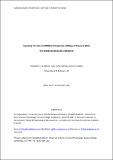Exploring the role of self/other perspective-shifting in theory of mind with behavioural and EEG measures
Abstract
Theory of Mind (ToM) refers to the ability to compute and attribute mental states to oneself and other people. This study sought to assess the extent of differentiation between “Self” and “Other” in ToM processes, and, of particular importance, the key role of perspective-shifting between “Self” and “Other”. Utilizing a newly established false-belief paradigm in a matched design, healthy adult participants completed the task whilst behavioural measures (response times, error rates) and electrophysiological (EEG) recordings were taken. Results revealed that self-oriented belief-attribution was faster and less error-prone than other-oriented belief-attribution, and demonstrated a key role of perspective-shifting. Perspective shifts from Self-to-Other resulted in longer response times and more errors than shifts from Other-to-Self. In contrast, no difference between self and other probes was found in no perspective-shift trials. Reflecting this, EEG recordings showed a significant interaction between Perspective-Shifting and Probe Type at an early onset across right parieto/occipito-lateral areas (250 ms post-stimulus onset), and across frontal-central areas from 500 ms post-stimulus onset, indicating the key role of these areas in ToM engagement. Results demonstrate that “Self” and “Other” can be distinguished at a behavioural level, and highlight the critical role of “Perspective-Shifting” in ToM processes.
Citation
Bradford , E E F , Gomez , J-C & Jentzsch , I 2019 , ' Exploring the role of self/other perspective-shifting in theory of mind with behavioural and EEG measures ' , Social Neuroscience , vol. 14 , no. 5 , pp. 530-544 . https://doi.org/10.1080/17470919.2018.1514324
Publication
Social Neuroscience
Status
Peer reviewed
ISSN
1747-0919Type
Journal article
Description
This work was supported by the Economic and Social Research Council [grant number ES/J500136/1] in the form of a three-year PhD studentship awarded to EB.Collections
Items in the St Andrews Research Repository are protected by copyright, with all rights reserved, unless otherwise indicated.

